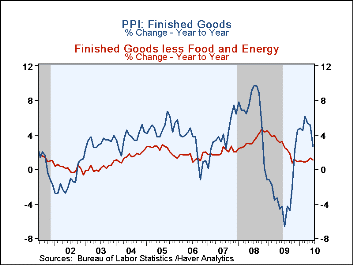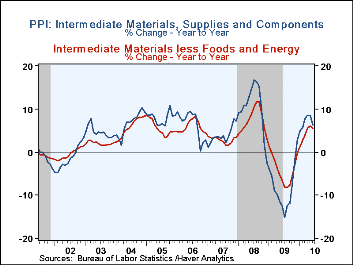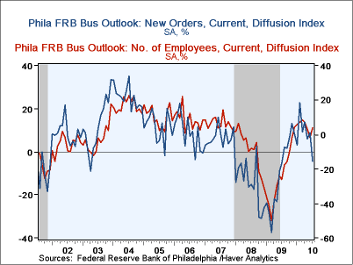 Global| Jul 15 2010
Global| Jul 15 2010U.S. Producer Prices Decline For Third Month, Again With Lower Food & Energy Costs
by:Tom Moeller
|in:Economy in Brief
Summary
Pricing pressures at the wholesale level again diminished last month. A 0.5% decline in the June PPI was the third in a row that owed to consecutive declines in food & energy prices. The drop exceeded Consensus expectations for a 0.1% [...]
 Pricing pressures at the wholesale level again diminished last month. A 0.5%
decline in the June PPI was the third in a row that owed to consecutive declines
in food & energy prices. The drop exceeded Consensus expectations for a 0.1%
slip. As a result of the decline, the y/y gain in prices backpedaled to 2.7%
from its March high of 6.1%.
Pricing pressures at the wholesale level again diminished last month. A 0.5%
decline in the June PPI was the third in a row that owed to consecutive declines
in food & energy prices. The drop exceeded Consensus expectations for a 0.1%
slip. As a result of the decline, the y/y gain in prices backpedaled to 2.7%
from its March high of 6.1%.
Finished food prices fell 2.2%, the third consecutive monthly drop. Not seasonally adjusted, the latest decline was led by lower fresh & dried vegetable prices (-11.3 y/y) and lower fresh fruit prices (+5.0% y/y). Beef prices also declined m/m (+15.2% y/y) but dairy product prices rose (13.6% y/y). Finished energy prices fell for the fourth month in the last five but remained up 8.0% y/y. Not seasonally adjusted gasoline prices dropped 4.6% (+6.2% y/y) and home heating oil prices fell 6.1% (+14.4% y/y). Finally, natural gas prices rose (1.2% y/y) and electricity prices rose (3.2% y/y).
Core pricing power diminished. The 0.1% increase in finished producer prices less food & energy was down from the 0.2% gains during the prior two months and matched Consensus expectations. Finished consumer goods prices less food & energy rose 0.2% leaving the 1.7% twelve-month increase nearly half the annual gains during the last two years. Finished durables prices fell 0.3% (-0.3% y/y) and reversed the May increase but core finished consumer nondurable goods prices strengthened with a 0.5% rise (3.2% y/y). Capital equipment prices were unchanged (0.3% y/y) versus annual gains between 1.0% and 3.0% back to 2004.
Earlier strength in intermediate goods prices diminished last month and they fell 0.9% (+6.3% y/y). Core pricing power also lagged with a 0.4% decline but prices remained up 5.4% y/y, nearly the strongest rise since late-2008. The strength continued to reflect increases in the prices of steel (30.5% y/y), copper (13.4% y/y) and plywood (15.5% y/y).
Price pressures fell last month at the earliest stage of processing. Crude materials prices fell 2.4% along with a 4.8% decline in core prices. The decline was led by lower scrap copper (+27.2% y/y) and lower iron & steel scrap (82.1% y/y) prices.
The producer price data is available in Haver's USECON database. More detailed data is in the PPI and in the PPIR databases.
Minutes of the Federal Open Market Committee for June 22-23, 2010 can be found here.
| Producer Price Index (%) | June | May | April | June Y/Y | 2009 | 2008 | 2007 |
|---|---|---|---|---|---|---|---|
| Finished Goods | -0.5 | -0.3 | -0.1 | 2.7 | -2.5 | 6.4 | 3.9 |
| Less Food & Energy | 0.1 | 0.2 | 0.2 | 1.0 | 2.6 | 3.4 | 2.0 |
| Intermediate Goods | -0.9 | 0.4 | 0.8 | 6.3 | -8.4 | 10.3 | 4.0 |
| Less Food & Energy | -0.4 | 0.3 | 1.1 | 5.4 | -4.2 | 7.4 | 2.8 |
| Crude Goods | -2.4 | -2.8 | -1.2 | 13.7 | -30.3 | 21.4 | 11.9 |
| Less Food & Energy | -4.8 | -1.6 | 4.0 | 30.4 | -23.5 | 14.8 | 15.6 |
Tom Moeller
AuthorMore in Author Profile »Prior to joining Haver Analytics in 2000, Mr. Moeller worked as the Economist at Chancellor Capital Management from 1985 to 1999. There, he developed comprehensive economic forecasts and interpreted economic data for equity and fixed income portfolio managers. Also at Chancellor, Mr. Moeller worked as an equity analyst and was responsible for researching and rating companies in the economically sensitive automobile and housing industries for investment in Chancellor’s equity portfolio. Prior to joining Chancellor, Mr. Moeller was an Economist at Citibank from 1979 to 1984. He also analyzed pricing behavior in the metals industry for the Council on Wage and Price Stability in Washington, D.C. In 1999, Mr. Moeller received the award for most accurate forecast from the Forecasters' Club of New York. From 1990 to 1992 he was President of the New York Association for Business Economists. Mr. Moeller earned an M.B.A. in Finance from Fordham University, where he graduated in 1987. He holds a Bachelor of Arts in Economics from George Washington University.








